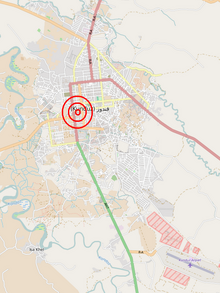| Kunduz hospital airstrike | |
|---|---|
| Part of Battle of Kunduz and the War in Afghanistan (2001–2021) | |
 Location of Kunduz MSF Trauma Center within Kunduz | |
| Type | Airstrike |
| Location | |
| Target | Kunduz Trauma Centre, Médecins Sans Frontières hospital |
| Date | 3 October 2015 |
| Executed by | |
| Casualties | 42[2] killed over 30 injured |
On 3 October 2015, a United States Air Force AC-130U gunship attacked the Kunduz Trauma Centre operated by Médecins Sans Frontières (MSF, or Doctors Without Borders) in the city of Kunduz, in the province of the same name in northern Afghanistan.[3][4][5][6][7][8][excessive citations] 42 people were killed[2] and over 30 were injured. Médecins Sans Frontières condemned the incident, calling it a deliberate breach of international humanitarian law and a war crime. It further stated that all warring parties had been notified about the hospital and its operations well in advance.[9][10]
The United States military initially said the airstrike was carried out to defend U.S. forces on the ground. Later, the United States commander in Afghanistan, General John F. Campbell, said the airstrike was requested by Afghan forces who had come under Taliban fire. Finally, Campbell said the airstrike was a US decision, made in the US chain of command and not requested by Afghan forces. Campbell said the attack was "a mistake," and, "We would never intentionally target a protected medical facility."[11][12] The USCENTCOM 15-6 report stated that General Campbell's own lack of strategic guidance and dissemination of certain Rules of Engagement were major contributing factors that led to the command and control breakdown prior to the airstrike.[13] Anonymous sources alleged that cockpit recordings showed the AC-130 crew questioned the strike's legality.[14]
On 7 October 2015, President Barack Obama issued an apology and announced the United States would be making condolence payments of $6,000 to the families of those killed in the airstrike.[15][16][17] Three investigations of the incident were conducted by NATO, a joint United States-Afghan group, and the United States Department of Defense. The Department of Defense released its findings on 29 April 2016. MSF has called for an international and independent probe, saying the armed forces who carried out the airstrike cannot conduct an impartial investigation of their own actions.[17]
- ^ "By evening, a hospital. By morning, a war zone". The Washington Post. 10 October 2015. Retrieved 18 October 2015.
- ^ a b Chris Johnston and agencies (12 December 2015). "MSF Afghanistan hospital airstrike death toll reaches 42". The Guardian. Retrieved 5 October 2021.
- ^ "MSF Kunduz hospital bombing death toll rises". The Sydney Morning Herald. 26 October 2015. Retrieved 30 April 2016.
- ^ "Afghanistan: Death toll from the MSF hospital attack in Kunduz still rising". Médecins Sans Frontières (MSF) International. Retrieved 30 April 2016.
- ^ Wang, Amy X. (4 October 2015). "The Aftermath of the Airstrike on Doctors Without Borders". The Atlantic. Retrieved 4 October 2015.
- ^ Cite error: The named reference
CNN_2015-10-03was invoked but never defined (see the help page). - ^ Rubin, Alissa J.; Southall, Ashley (4 October 2015). "Doctors Without Borders Says It Is Leaving Kunduz After Strike on Hospital". The New York Times. Retrieved 5 October 2015.
- ^ "Doctors Without Borders airstrike: MSF says 33 people still missing". The Guardian. 8 October 2015. Retrieved 9 October 2015.
- ^ "Afghanistan: MSF Demands Explanations After Deadly Airstrikes Hit Hospital in Kunduz". Doctors Without Borders. 3 October 2015. Archived from the original on 6 October 2015. Retrieved 4 October 2015.
- ^ Doctors Without Borders Enraged Over 'Deliberate' Kunduz Hospital Bombing. The Huffington Post, 6 October 2015.
- ^ Cite error: The named reference
WPost_struggleswas invoked but never defined (see the help page). - ^ Rosenberg, Matthew (5 October 2015). "U.S. General Says Afghans Requested Airstrike That Hit Kunduz Hospital". The New York Times. Retrieved 6 October 2015.
- ^ "Commander Discusses Hospital Airstrike". The New York Times. 6 October 2015. Retrieved 30 April 2016.
- ^ Cite error: The named reference
slate.comwas invoked but never defined (see the help page). - ^ EDT, Danielle Moylan On 04/09/16 at 3:29 PM (9 April 2016). "The practice of doling out condolence payments to Afghan victims of U.S. strikes is drawing scrutiny". Newsweek. Retrieved 21 April 2020.
{{cite web}}: CS1 maint: numeric names: authors list (link) - ^ "Pentagon says U.S. to make payments to families of Kunduz air strike victims". Reuters UK. 10 October 2015. Archived from the original on 4 February 2016. Retrieved 30 April 2016.
- ^ a b Shear, Michael D.; Sengupta, Somini (8 October 2015). "Obama Issues Rare Apology Over Bombing of Doctors Without Borders Hospital in Afghanistan". The New York Times. Retrieved 8 October 2015.